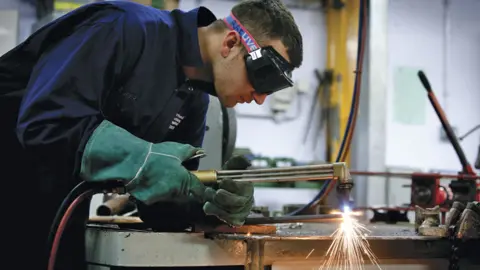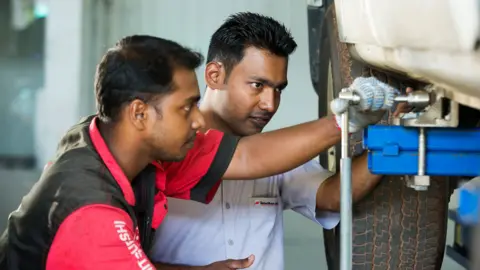Tackling skills gap ‘harmed by short-term politics’
 BBC
BBCSkills training in England has been undermined by "short-term, disjointed and inconsistent" policies, says the City and Guilds training body.
Chief executive Chris Jones blamed a constant churn of initiatives and announcements from politicians wanting to be "seen to be doing something".
He warned that spending on the new vocational T-levels could be wasted.
But Education Secretary Damian Hinds has called on businesses to back the new T-level qualifications.
There have been warnings about skills gaps and weaknesses in vocational training, but Mr Jones says it is "deeply concerning" that "policy is not driving any sustainable improvement in raising skills".
'Flawed'
He said there had been a high turnover of ministers with responsibility for skills - 70 in 35 years - with each tempted to launch another initiative.

"Ministers think structural change is not only easy to implement - but I'll be seen to be doing something and I can claim something better will come from it," he says.
But implementation is often "fundamentally flawed", says Mr Jones, head of the City and Guilds group, one of the longest-established bodies for accrediting crafts, trades and skills.
"Either a change of government cancels it or we haven't been clear at the outset what we were trying to achieve," says Mr Jones.
The outcome, he warns is that too many "badly-needed training and education programmes are not fit for purpose".
Mr Jones, launching a report called Sense and Instability, wants a more independent body for skills policy, with a long-term, strategic approach and less political interference.
'Hollow' claims
The latest proposed change is the launch of T-levels, which are intended to be the vocational equivalent of A-levels.
Mr Jones supports the principle of a high status vocational qualification, but he says that beyond "warm words" it is not clear what will make them successful or provide value for money.

Previous sets of qualifications, such as diplomas, were launched and then cancelled, and he says he wants a more objective approach to T-levels, rather than rhetoric.
"You cannot claim it to be a 'gold standard'. That is a hollow statement and is totally unsubstantiated," says Mr Jones.
He warns of too much emphasis on volume targets such as numbers of learners, rather than the quality or purpose of qualifications.
Too often with vocational and training initiatives, he says it is difficult to know whether hundreds of millions of pounds are "going to waste".
 City and Guilds
City and GuildsHe says the lack of progress is frustrating for employers facing skills shortages, with warning of potentially "devastating" consequences for the UK's economy.
T-level shake-up
A Department for Education spokeswoman says that T-levels "represent the biggest shake up to technical education in a generation".
The new qualifications are designed to "help businesses to build the skilled workforce they need for the future".
This weekend, the education secretary called on businesses to help create opportunities for young people to get work experience, as part of their T-levels.
He promised £7m to support work-experience projects, for the qualifications being rolled out from September 2020.
"The completion of a high-quality industry placement will be at the heart of every T-level and is part of what will set these new courses apart from every attempt to reform technical and vocational education in the past 70 years," said Mr Hinds.
"To make a success of T-levels, we need businesses working in partnership with us and colleges.
"Industry placements will help young people build the confidence and skills they need to get a head start in their careers and they'll help business maximise their talent pipeline for the future."
